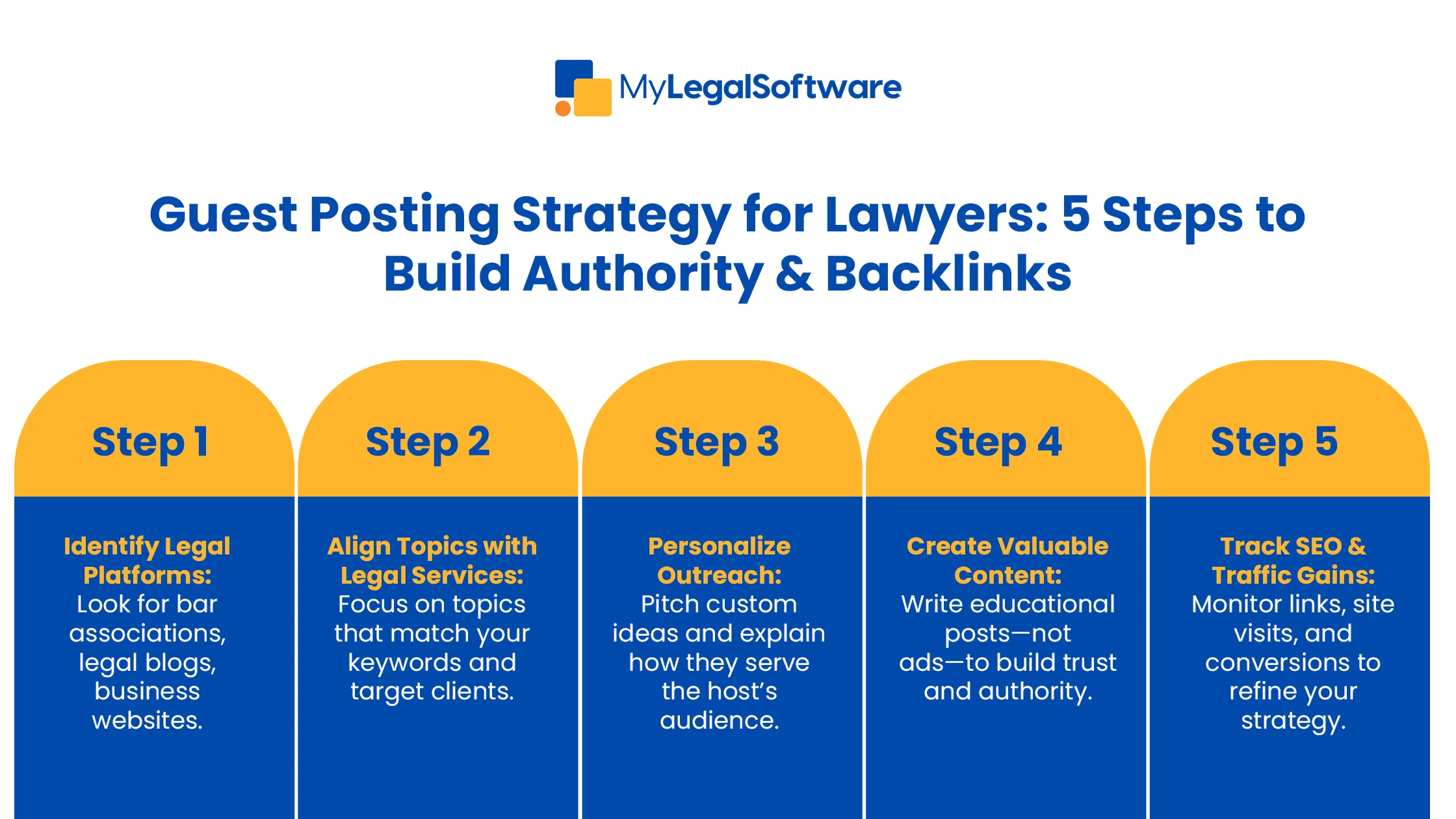In 2025, guest posting remains one of the most effective marketing strategies for lawyers who want to grow their online presence. It’s not just about getting published on other websites; it’s about building authority, gaining high-quality backlinks, and showing up where your potential clients are already reading.
When done right, a strong guest posting strategy can help your law firm rise in search rankings, expand your referral network, and position you as a thought leader. It’s both an SEO tool and a trust-building tactic—and that’s exactly why it’s important in any legal marketing plan.
What Is Guest Posting?
A guest blog post is any article or piece of content you write for publication on another website. In the legal industry, this could mean publishing on bar association blogs, legal news sites, niche directories, or even local business platforms.
But having a guest post strategy means you’re not writing randomly. You’re choosing platforms that reach your ideal audience, selecting topics that highlight your legal expertise, and making sure every post offers value while helping your website grow its authority.
Unlike random guest blogging, which focuses only on getting a link or two, a structured guest posting strategy prioritizes long-term audience targeting, topic relevance, and quality backlinks. For lawyers, that means reaching potential clients through trusted sources and earning referral traffic that actually converts.
Benefits of Guest Posting for Law Firms

In a competitive digital space, guest posting offers real, long-term returns for legal brands. It’s more than just content; it’s a bridge between visibility and credibility.
1. Boost SEO with High-Authority Backlinks
When your article gets published on a reputable website, your firm gets a backlink. These high-authority links help improve your Google rankings, which means more potential clients find your website when searching for legal help. That’s why guest posting link building strategies are essential for SEO growth.
2. Build Legal Niche Authority and Trust
Publishing on platforms respected within the legal community helps establish your authority. Whether you’re writing for peers or potential clients, sharing useful insights shows that you know your area of law inside and out.
3. Generate Referral Traffic to Your Website
A well-placed guest post can drive traffic directly to your site. If you write about topics people are actively searching for, and include a compelling call to action, your post becomes a lead generation tool, bringing in potential clients already interested in what you offer.
4. Strengthen Lawyer-to-Lawyer Networking and Outreach
Guest blogging often opens the door to deeper collaboration. From podcast invites to referrals and co-branded events, your guest post can be the start of a new professional relationship with other attorneys.
5. Support Local and Practice-Specific Visibility
Many local business blogs, legal aid organizations, and bar association websites accept guest contributions. Posting here increases your exposure to specific client demographics or practice niches, like immigration law, family law, or personal injury.
How to Create a Legal Guest Post Strategy That Works

A great guest posting strategy doesn’t happen by accident. It takes planning, research, and focus on long-term goals. Here’s how to build a process that works.
Research Law-Relevant Sites with Real Audiences
Look for platforms that serve your audience: local business sites, legal news outlets, bar associations, or practice-specific blogs. Avoid low-quality link farms and focus on websites that actually engage readers.
Align Topics with Your Legal Services and Target Keywords
Don’t just write about any legal topics. Choose subjects that match your core services and the keywords you’re trying to rank for. This keeps your efforts focused and aligned with your goals.
Personalize Every Outreach Email
Generic outreach often gets ignored. When you reach out, reference something recent from their blog, share why your idea is a fit for their readers, and explain the value you’re bringing. A little personalization goes a long way.
Write High-Value Posts, Not Ads
A guest blog is not a place to pitch your services. It’s a place to teach, inform, or clarify something useful. Keep the focus on helping the reader and let your expertise speak for itself.
Track Performance: Traffic, Backlinks, and Conversions
Use analytics to track how your guest posts perform. Are you getting referral traffic? Are people staying on your site? Are those backlinks helping your SEO rankings? This feedback helps refine your guest posting strategy over time.
Guest Posting Link Building Strategy for Lawyers
If SEO is part of your marketing game plan, your guest posting link building strategy needs to be intentional. It’s not just about getting links; it’s about getting the right links in the right places. Here’s how to build links through guest blogging that will actually help your law firm grow:
Dofollow vs. Nofollow Links
Guest posts should ideally earn dofollow backlinks; these tell search engines to pass link authority (ranking power) to your site. Nofollow links may still offer referral traffic and credibility, but they don’t contribute directly to SEO.
- Aim for dofollow links from high-quality, relevant legal websites whenever possible.
- Diversify your sources to avoid looking spammy: legal blogs, directories, and business sites can all play a role.
Legal Blogs, Bar Associations, and Directories
Sites tied to the legal profession offer more trust and contextual value than generic blogs.
- Target bar association blogs and niche legal news outlets for their credibility and reach.
- Consider guest posting on legal directories or local business blogs tied to your community or practice type.
Anchor Text and Google Penalties
Using the right anchor text (the clickable text in a link) matters for SEO and compliance.
- Avoid keyword stuffing. Don’t over-optimize anchor text with exact-match keywords, like “best immigration lawyer 2025.”
- Use natural, helpful phrases like “speak with a family law attorney” or “read our immigration guide.”
- Vary your anchor text to maintain a natural backlink profile.
By focusing on quality, legal relevance, and natural link placement, your guest post link building strategies can strengthen your website without triggering SEO penalties.
Guest Post Outreach Strategy Tips that Work in 2025
Getting your guest posts published starts with an effective guest post outreach strategy. Outreach is where most firms struggle, but with the right tone and structure, your pitches can land consistently.
Start with prospecting. Identify websites that accept legal content by checking their blogs, contributor pages, or by searching “[your niche] + write for us”. Make a shortlist of relevant, high-authority targets.
When you’re ready to pitch, don’t send a generic email. Customize it:
- Reference a recent blog post on their site and explain why it resonated with you.
- Share a topic idea that fits their audience and aligns with your legal services.
- Keep your tone professional, but friendly and helpful.
After you pitch, follow up if you haven’t heard back within a week or two. Editors may be busy. A kind reminder can move your pitch to the top of their inbox. A consistent, thoughtful guest post outreach strategy pays off with better placement and lasting relationships.
Common Mistakes to Avoid in Guest Blogging
Guest posting can be powerful, but common missteps can derail your entire strategy. Here are mistakes lawyers should avoid:
- Submitting low-quality or generic content: A recycled blog won’t get you published. Editors want unique, well-written content tailored to their audience. Invest time in each piece.
- Focusing only on links, not value: If you treat guest posting only as a backlink grab, it will show. Focus on delivering insights or advice that actually helps readers.
- Ignoring site guidelines or tone: Every site has its own submission rules and writing style. Read the blog before you pitch and match their tone and format closely.
- Using the same pitch/template everywhere: Sending the same message to dozens of sites may seem efficient, but it usually gets ignored. Personalize each outreach message to improve your chances.
Final Thoughts: Guest Posting That Builds Your Legal Brand
A smart, consistent guest blog post strategy does more than improve your SEO; it helps you build a legal brand that people trust. When you stay consistent, focus on value, and choose the right platforms, guest blogging can be one of the most effective tools in your digital marketing.
While you work on growing your reach through content, it’s just as important to manage your internal case management system well. That’s why you need MyLegalSoftware. As your online presence grows, you need a case management solution that helps you handle intake, communication, and client matters without chaos. From first contact to case resolution, MyLS helps you stay organized while you build your reputation.
Try MyLegalSoftware free for 14 days and see how a streamlined case management system can support your growth, online and offline.
Frequently Asked Questions
-
How do I start a guest posting strategy for my law firm in 2025?
-
What types of websites accept guest posts from lawyers?
-
Can guest blogging really improve SEO for legal websites?
-
How many guest posts should I publish for effective link building?
-
Is guest posting still safe for link building in 2025?
Begin by identifying relevant legal websites, creating a list of topics, and pitching editors with personalized outreach emails.
Bar association blogs, legal publications, business websites, and practice-specific directories often welcome high-quality legal guest content.
Yes, when targeted and well-executed, guest posts can boost your backlink profile, improve rankings, and bring in qualified leads.
Even one to two high-quality guest posts per month can drive results, especially when published on trusted, relevant sites.
Absolutely, as long as you focus on relevance, helpful content, and natural links, guest posting remains a safe and effective SEO method.








